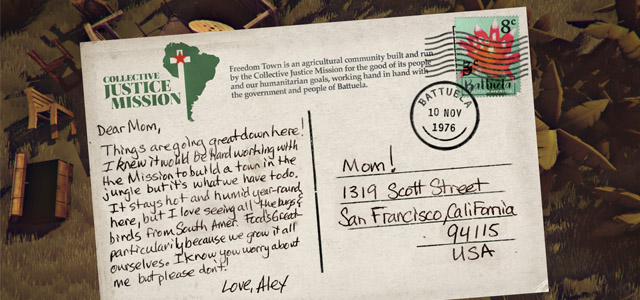The Church in the Darkness is a fascinating upcoming game that tackles the subject of cults.
Set in the 1970s, the game sees the player infiltrate The Collective Justice Mission, a sect that the main character’s nephew has joined. This group is led by the charismatic Isaac and Rebecca Walker and based in the jungles of South America.
The Church in the Darkness’ creator, Richard Rouse III is an experienced games designer with over twenty years’ experience. He believes that people join cults for complex reasons, and that videogames are capable of telling more complex stories than black and white narratives of good versus evil. He told Insights that he was inspired to make the game because he “found cults fascinating as alternate societies.”
“They are made up of people from “normal” society who then decide to leave all that behind and try to do something different,” Rouse explained. “They’re often mocked or attacked by the people they leave behind, and sometimes for good reason.”
“Some groups we call “cults” are actually just trying to make a better life for themselves, their families, or the entire world. Often these people have very noble intentions.”
“But then of course, groups we call “cults” can go wrong. Power consolidated in a single person or small leadership group can be abused, and often is. What originally seemed a “more free” way to live can be twisted and turned into a prison, and often when members don’t even realize what’s happened. The best of intentions become subverted. And in the worst cases, horrible tragedies happen. ”
“But there’s lots of groups that choose to break away and live in alternate societies where nothing goes ‘wrong’. They choose to live a different way for a time or for the rest of their lives—and they are happy doing it, even if they may seem weird to “mainstream” society. Should these people be stopped from living how they want to live?”
“So the game seemed like an ideal place to explore these topics, because in a game we can make the story change every time you play.”
One of The Church in the Darkness’ more fascinating features, then, is that the nature of the The Collective Justice Mission will change with each play through. Sometimes it will be a dangerous cult from which the player character’s nephew will need to be rescued. At other points, they will be more benign.
“The Collective Justice Mission always has a strong Christian socialist dogma. They always hate the US government, they always arm themselves and will fight to defend the new home they have built.”
“Sometimes they will take that power too far and things will go horribly wrong, but sometimes they won’t. Each time the player plays the game they need to be detectives and try to figure out what version of the group they are dealing with that time—and then make their own choices accordingly. Do they force their nephew to leave, or do they let him stay? Do they confront the cult leaders themselves? In a game you can change the story and let the player make choices about how it resolves. So for all those reasons, I found a cult a fascinating setting to explore in a game.”
The Church in the Darkness is one of a few recent games that explore cults as one of their major themes, another recent example being Far Cry 5. Rouse attributes this interest to the wider context in which the game has been conceived.
“In terms of why cults are popular right now—part of the reason people join cults is they are dissatisfied with their lives or with their country or the entire world. They’re so unhappy with what is happening in society they choose to leave it. In the US in the 1970s (when The Church in the Darkness is set) all these new groups popped up at the same time people became disillusioned with their government, whether through the Vietnam War, Nixon’s impeachment, or other illegal acts the government was revealed to have perpetrated. People felt helpless and were afraid of nuclear annihilation at any moment, so going to live some other way was very appealing.”
“I think that same dissatisfaction is happening again today in the US (and other parts of the world as well), so people are once again thinking, ‘Maybe we should do things differently.’”
“Obviously I can’t speak to why the Far Cry 5 team made the choices they did, but you can see some possible inspiration there in the state of our world and people’s dissatisfaction with it.”
Despite the game’s exploration of cults, Rouse says that he does not have an axe to grind against faith.
“The game’s definitely not anti-religion,” he said.
“As someone raised Catholic who still has many very devout people in my family, along with team members of other faiths who worked on the game, I like to think we know the good a strong religious conviction can do, but also how that can be twisted and lead to horrible things. This game explores both of those outcomes.”
The Church in the Darkness releases next year on Steam, Mac, PS4, and Xbox One. For more information on the game, visit the official website.
Jonathan Foye is Insights’ Editor






